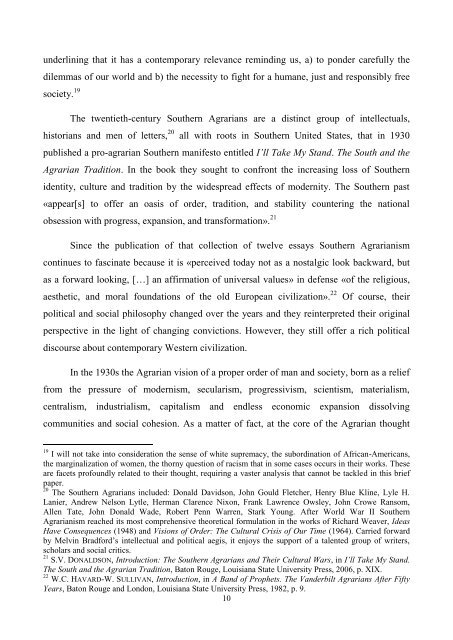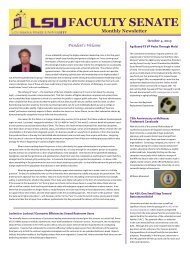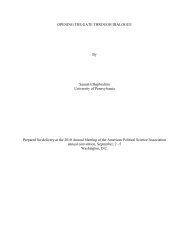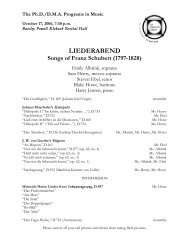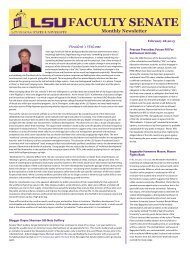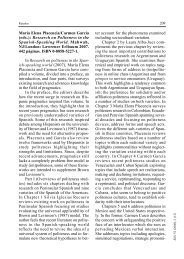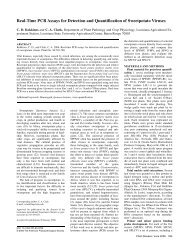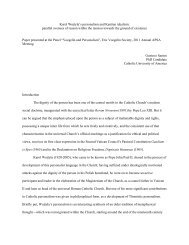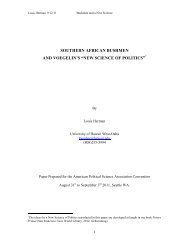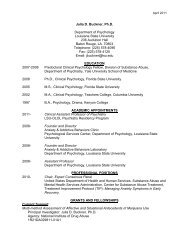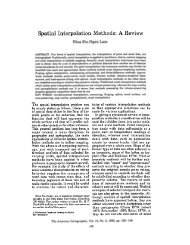Nicoletta Stradaioli, University of Perugia - Louisiana State University
Nicoletta Stradaioli, University of Perugia - Louisiana State University
Nicoletta Stradaioli, University of Perugia - Louisiana State University
Create successful ePaper yourself
Turn your PDF publications into a flip-book with our unique Google optimized e-Paper software.
underlining that it has a contemporary relevance reminding us, a) to ponder carefully the<br />
dilemmas <strong>of</strong> our world and b) the necessity to fight for a humane, just and responsibly free<br />
society. 19<br />
The twentieth-century Southern Agrarians are a distinct group <strong>of</strong> intellectuals,<br />
historians and men <strong>of</strong> letters, 20 all with roots in Southern United <strong>State</strong>s, that in 1930<br />
published a pro-agrarian Southern manifesto entitled I’ll Take My Stand. The South and the<br />
Agrarian Tradition. In the book they sought to confront the increasing loss <strong>of</strong> Southern<br />
identity, culture and tradition by the widespread effects <strong>of</strong> modernity. The Southern past<br />
«appear[s] to <strong>of</strong>fer an oasis <strong>of</strong> order, tradition, and stability countering the national<br />
obsession with progress, expansion, and transformation». 21<br />
Since the publication <strong>of</strong> that collection <strong>of</strong> twelve essays Southern Agrarianism<br />
continues to fascinate because it is «perceived today not as a nostalgic look backward, but<br />
as a forward looking, […] an affirmation <strong>of</strong> universal values» in defense «<strong>of</strong> the religious,<br />
aesthetic, and moral foundations <strong>of</strong> the old European civilization». 22 Of course, their<br />
political and social philosophy changed over the years and they reinterpreted their original<br />
perspective in the light <strong>of</strong> changing convictions. However, they still <strong>of</strong>fer a rich political<br />
discourse about contemporary Western civilization.<br />
In the 1930s the Agrarian vision <strong>of</strong> a proper order <strong>of</strong> man and society, born as a relief<br />
from the pressure <strong>of</strong> modernism, secularism, progressivism, scientism, materialism,<br />
centralism, industrialism, capitalism and endless economic expansion dissolving<br />
communities and social cohesion. As a matter <strong>of</strong> fact, at the core <strong>of</strong> the Agrarian thought<br />
19<br />
I will not take into consideration the sense <strong>of</strong> white supremacy, the subordination <strong>of</strong> African-Americans,<br />
the marginalization <strong>of</strong> women, the thorny question <strong>of</strong> racism that in some cases occurs in their works. These<br />
are facets pr<strong>of</strong>oundly related to their thought, requiring a vaster analysis that cannot be tackled in this brief<br />
paper.<br />
20<br />
The Southern Agrarians included: Donald Davidson, John Gould Fletcher, Henry Blue Kline, Lyle H.<br />
Lanier, Andrew Nelson Lytle, Herman Clarence Nixon, Frank Lawrence Owsley, John Crowe Ransom,<br />
Allen Tate, John Donald Wade, Robert Penn Warren, Stark Young. After World War II Southern<br />
Agrarianism reached its most comprehensive theoretical formulation in the works <strong>of</strong> Richard Weaver, Ideas<br />
Have Consequences (1948) and Visions <strong>of</strong> Order: The Cultural Crisis <strong>of</strong> Our Time (1964). Carried forward<br />
by Melvin Bradford’s intellectual and political aegis, it enjoys the support <strong>of</strong> a talented group <strong>of</strong> writers,<br />
scholars and social critics.<br />
21<br />
S.V. DONALDSON, Introduction: The Southern Agrarians and Their Cultural Wars, in I’ll Take My Stand.<br />
The South and the Agrarian Tradition, Baton Rouge, <strong>Louisiana</strong> <strong>State</strong> <strong>University</strong> Press, 2006, p. XIX.<br />
22<br />
W.C. HAVARD-W. SULLIVAN, Introduction, in A Band <strong>of</strong> Prophets. The Vanderbilt Agrarians After Fifty<br />
Years, Baton Rouge and London, <strong>Louisiana</strong> <strong>State</strong> <strong>University</strong> Press, 1982, p. 9.<br />
10


